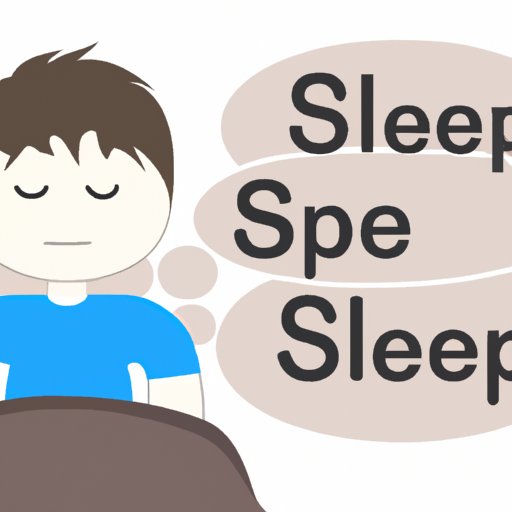
I. Introduction
If you’ve ever struggled with weight loss, you are not alone. Millions of people worldwide face this common problem every day. However, what you might not know is that the solution to this issue could be as simple as getting a good night’s sleep. In this article, we’ll explore the relationship between sleep and weight loss in detail and discuss research-based strategies to leverage the power of sleep for healthy and sustainable weight loss.
II. The Relationship Between Sleep and Weight Loss: A Comprehensive Review
According to scientific research studies, sleep has a significant impact on hormones related to appetite, metabolism, and energy balance. Leptin and ghrelin are two such hormones, which are closely linked to hunger and satiety.
Inadequate sleep leads to reduced levels of leptin, the hormone that signals satiety. On the other hand, it causes an increase in ghrelin, which signals hunger. This lack of balance leads to overeating, decreased energy levels, and weight gain.
Sleep deprivation also influences other hormones, such as cortisol, insulin, and growth hormone. These hormones affect blood sugar levels and fat distribution, leading to insulin resistance, metabolic syndrome, and obesity.
III. How to Optimize Your Sleep for Weight Loss: Expert Tips and Recommendations
Fortunately, there are several strategies and tips you can apply to improve your sleep quality and duration. Establishing a healthy sleep routine is essential in this regard. This includes setting a regular bedtime and wake-up time, including weekends, to maintain consistency.
Creating a sleep-conducive environment is another critical factor in optimizing sleep quality. This involves keeping your bedroom cool, dark, and quiet, reducing distractions such as screens, and incorporating relaxation techniques such as meditation or breathing exercises.
Finally, improving sleep quality through regular physical activity, a healthy diet, and reducing alcohol intake and caffeine consumption contribute to better sleep and weight loss results.
IV. The Science Behind Sleep Deprivation and Weight Gain: What You Need to Know
Sleep deprivation disrupts the body’s natural rhythms and hormonal balance, leading to weight gain and obesity over time. It also increases the risk of developing sleep apnea, which is linked to a higher risk of obesity.
Moreover, lack of sleep affects decision-making, impulse control, and emotional regulation, leading to unhealthy eating habits. This is because sleep deprivation impairs the functioning of the prefrontal cortex, the part of the brain responsible for these processes.
V. A Sleep-Based Approach to Weight Loss: Strategies and Techniques to Try Out
A Sleep-based weight loss approach focuses on improving sleep first and combining healthy sleep habits with other lifestyle changes. This approach leads to sustainable weight loss results and better overall health.
Practical strategies to implement a sleep-focused approach include adopting a consistent sleep routine, improving sleep quality, and addressing other factors such as stress and medication that impact sleep quality.
VI. The Role of Sleep Quality in Weight Management: Key Factors and Factors to Consider
In addition to the strategies discussed above, it’s essential to address other factors that impact sleep quality. Alcohol consumption, caffeine, and nicotine use, medication, stressful situations, and underlying health conditions can all impact sleep quality, leading to weight gain.
To improve sleep quality, it is necessary to address these factors, such as reducing alcohol consumption and stress levels, following a healthy diet, and seeking medical support or counseling where necessary.
VII. Debunking Common Myths About Sleep and Weight Loss: What the Evidence Says
Many common misconceptions exist around sleep and weight loss. For example, some people believe that they can “catch up” on sleep over the weekend to make up for lost sleep during the week.
However, research shows that sleep debt cannot be fully repaid, and this approach is not effective in preventing weight gain or obesity. Other myths include the idea that weight loss supplements or drinks can compensate for poor sleep habits.
VIII. Conclusion
As we explore the relationship between sleep and weight loss, it is clear that sleep plays a critical role in our overall health and well-being. By taking practical steps to improve sleep quality and duration, we can achieve healthy and sustainable weight loss results while improving our overall health.
Therefore, it’s essential to prioritize sleep, create a healthy sleep routine, and address any underlying factors that impact sleep quality to achieve successful weight loss results.





